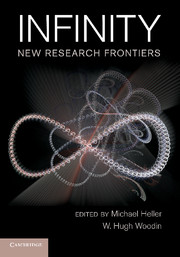Book contents
- Frontmatter
- Contents
- Contributors
- Preface
- Acknowledgments
- Introduction
- I Perspectives on Infinity from History
- II Perspectives on Infinity from Mathematics
- 2 The Mathematical Infinity
- 3 Warning Signs of a Possible Collapse of Contemporary Mathematics
- III Technical Perspectives on Infinity from Advanced Mathematics
- IV Perspectives on Infinity from Physics and Cosmology
- V Perspectives on Infinity from Philosophy and Theology
- Index
3 - Warning Signs of a Possible Collapse of Contemporary Mathematics
Published online by Cambridge University Press: 07 June 2011
- Frontmatter
- Contents
- Contributors
- Preface
- Acknowledgments
- Introduction
- I Perspectives on Infinity from History
- II Perspectives on Infinity from Mathematics
- 2 The Mathematical Infinity
- 3 Warning Signs of a Possible Collapse of Contemporary Mathematics
- III Technical Perspectives on Infinity from Advanced Mathematics
- IV Perspectives on Infinity from Physics and Cosmology
- V Perspectives on Infinity from Philosophy and Theology
- Index
Summary
I rejoice that we live in a world of boundless, infinite possibilities, one in which, with Blake, we can see a world in a grain of sand and a heaven in a wildflower, hold infinity in the palm of our hand and eternity in an hour. I rejoice that the sacred scriptures of our faith portray a God who listens to prayer, who loves us and longs to lead us. I rejoice that my chosen line of work, mathematics, has enabled me to bring into being new things that did not exist before and to greet with wonder and awe many amazing inventions of my fellow workers. I rejoice that daily we live immersed in infinity, that we have the freedom not only to make choices but at times to be the agent, by will or by grace, to sing to the Lord a new song.
Is infinity real? For example, are there infinitely many numbers? Yes indeed. When my granddaughter was a preschooler, she asked for a problem to solve. I gave her two seventeen-digit numbers, chosen arbitrarily except that no carrying would be involved in finding the sum. When she summed the two numbers correctly, she was overjoyed to hear that she had solved a mathematical problem that no one had ever solved before.
The celebration of infinity is the celebration of life, of newness, of becoming, of the wonder of possibilities that cannot be listed in a finished, static rubric.
- Type
- Chapter
- Information
- InfinityNew Research Frontiers, pp. 76 - 86Publisher: Cambridge University PressPrint publication year: 2011
- 9
- Cited by



